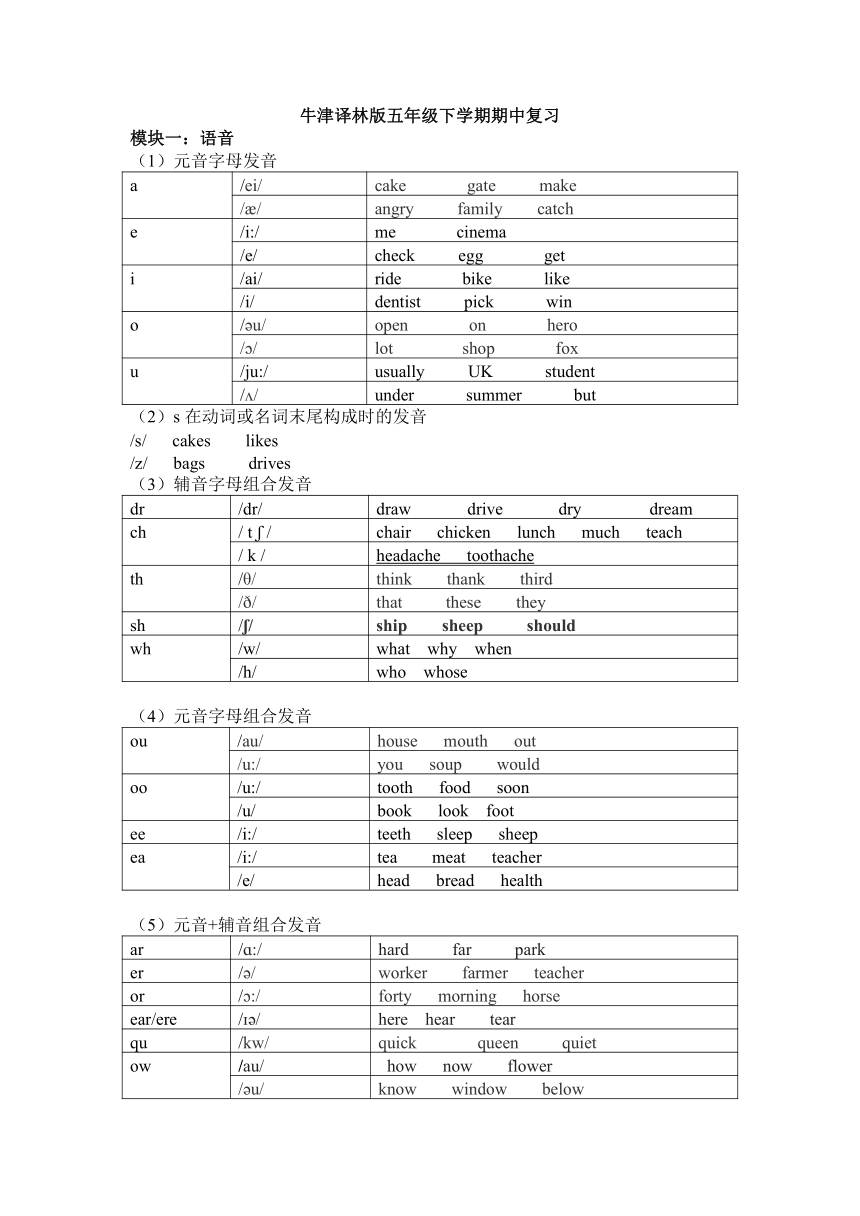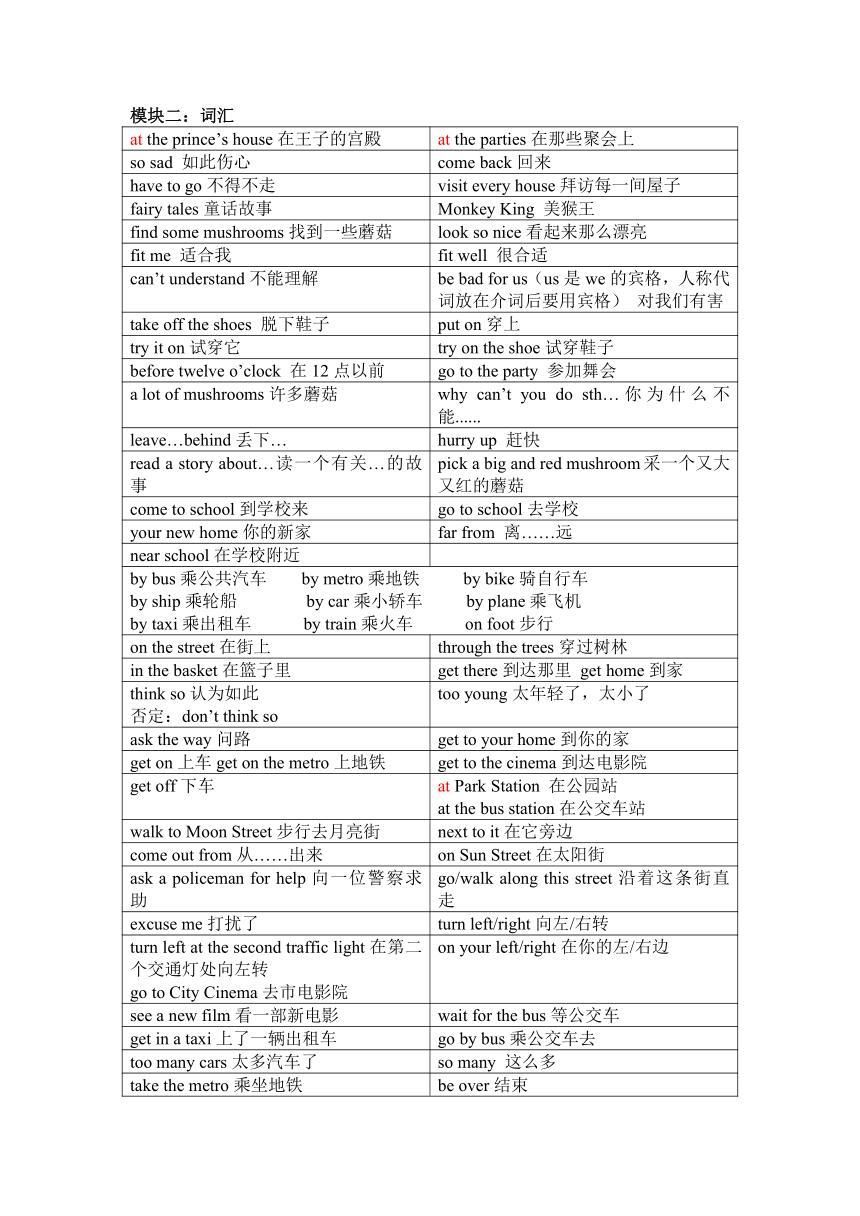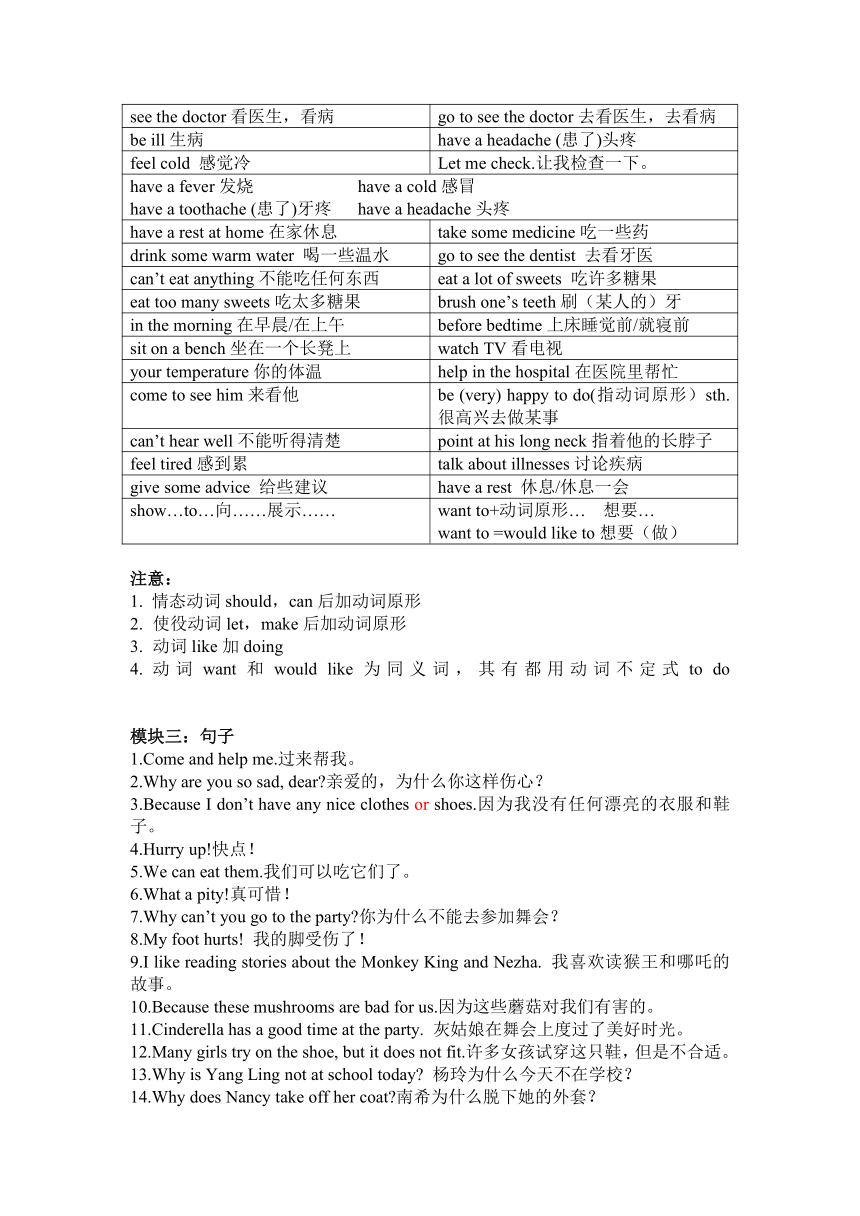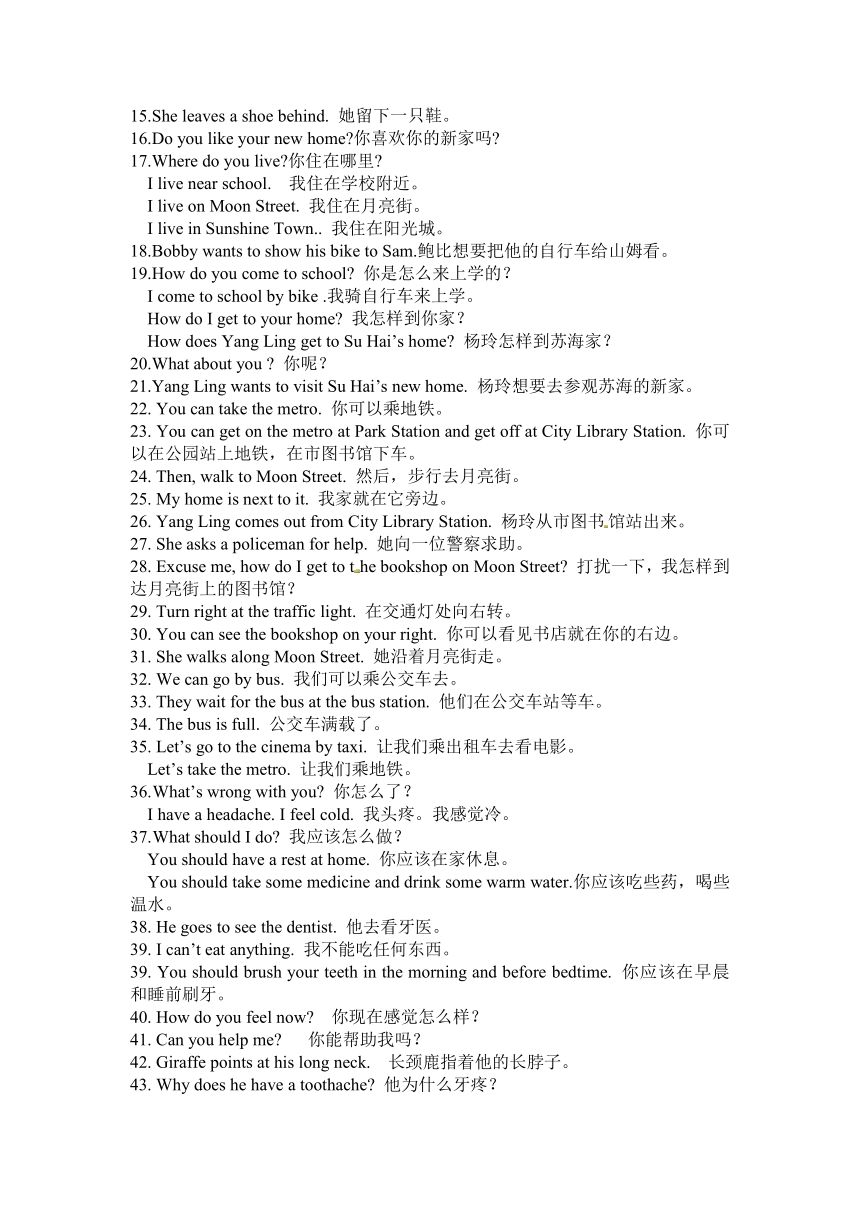牛津译林版五年级下学期期中复习-知识点
文档属性
| 名称 | 牛津译林版五年级下学期期中复习-知识点 |  | |
| 格式 | zip | ||
| 文件大小 | 163.5KB | ||
| 资源类型 | 教案 | ||
| 版本资源 | 牛津译林版 | ||
| 科目 | 英语 | ||
| 更新时间 | 2022-04-17 21:25:36 | ||
图片预览




文档简介
牛津译林版五年级下学期期中复习
模块一:语音
元音字母发音
a /ei/ cake gate make
/ / angry family catch
e /i:/ me cinema
/e/ check egg get
i /ai/ ride bike like
/i/ dentist pick win
o / u/ open on hero
/ / lot shop fox
u /ju:/ usually UK student
/ / under summer but
(2)s在动词或名词末尾构成时的发音
/s/ cakes likes
/z/ bags drives
(3)辅音字母组合发音
dr /dr/ draw drive dry dream
ch / t / chair chicken lunch much teach
/ k / headache toothache
th /θ/ think thank third
/ / that these they
sh / / ship sheep should
wh /w/ what why when
/h/ who whose
元音字母组合发音
ou /au/ house mouth out
/u:/ you soup would
oo /u:/ tooth food soon
/u/ book look foot
ee /i:/ teeth sleep sheep
ea /i:/ tea meat teacher
/e/ head bread health
元音+辅音组合发音
ar /ɑ:/ hard far park
er / / worker farmer teacher
or / :/ forty morning horse
ear/ere / / here hear tear
qu /kw/ quick queen quiet
ow /аu/ how now flower
/ u/ know window below
模块二:词汇
at the prince’s house在王子的宫殿 at the parties在那些聚会上
so sad 如此伤心 come back回来
have to go不得不走 visit every house拜访每一间屋子
fairy tales童话故事 Monkey King 美猴王
find some mushrooms找到一些蘑菇 look so nice看起来那么漂亮
fit me 适合我 fit well 很合适
can’t understand不能理解 be bad for us(us是we的宾格,人称代词放在介词后要用宾格) 对我们有害
take off the shoes 脱下鞋子 put on穿上
try it on试穿它 try on the shoe试穿鞋子
before twelve o’clock 在12点以前 go to the party 参加舞会
a lot of mushrooms许多蘑菇 why can’t you do sth…你为什么不能......
leave…behind丢下… hurry up 赶快
read a story about…读一个有关…的故事 pick a big and red mushroom采一个又大又红的蘑菇
come to school到学校来 go to school去学校[
your new home你的新家 far from 离……远
near school在学校附近
by bus乘公共汽车 by metro乘地铁 by bike骑自行车 by ship乘轮船 by car乘小轿车 by plane乘飞机by taxi乘出租车 by train乘火车 on foot步行
on the street在街上 through the trees穿过树林
in the basket在篮子里 get there到达那里 get home到家
think so认为如此否定:don’t think so too young太年轻了,太小了
ask the way问路 get to your home到你的家
get on上车get on the metro上地铁 get to the cinema到达电影院
get off下车 at Park Station 在公园站at the bus station在公交车站
walk to Moon Street步行去月亮街 next to it在它旁边
come out from从……出来 on Sun Street在太阳街
ask a policeman for help向一位警察求助 go/walk along this street沿着这条街直走
excuse me打扰了 turn left/right向左/右转
turn left at the second traffic light在第二个交通灯处向左转go to City Cinema去市电影院 on your left/right在你的左/右边
see a new film看一部新电影 wait for the bus等公交车
get in a taxi上了一辆出租车 go by bus乘公交车去
too many cars太多汽车了 so many 这么多
take the metro乘坐地铁 be over结束
see the doctor看医生,看病 go to see the doctor去看医生,去看病
be ill生病 have a headache (患了)头疼
feel cold 感觉冷 Let me check.让我检查一下。
have a fever发烧 have a cold感冒have a toothache (患了)牙疼 have a headache头疼
have a rest at home在家休息 take some medicine吃一些药
drink some warm water 喝一些温水 go to see the dentist 去看牙医
can’t eat anything不能吃任何东西 eat a lot of sweets 吃许多糖果
eat too many sweets吃太多糖果 brush one’s teeth刷(某人的)牙
in the morning在早晨/在上午 before bedtime上床睡觉前/就寝前
sit on a bench坐在一个长凳上 watch TV看电视
your temperature你的体温 help in the hospital在医院里帮忙
come to see him来看他 be (very) happy to do(指动词原形)sth.很高兴去做某事
can’t hear well不能听得清楚 point at his long neck指着他的长脖子
feel tired感到累 talk about illnesses讨论疾病
give some advice 给些建议 have a rest 休息/休息一会
show…to…向……展示…… want to+动词原形… 想要…want to =would like to想要(做)
注意:
情态动词should,can后加动词原形
使役动词let,make后加动词原形
动词like加doing
动词want和would like为同义词,其有都用动词不定式to do
模块三:句子
1.Come and help me.过来帮我。
2.Why are you so sad, dear 亲爱的,为什么你这样伤心?
3.Because I don’t have any nice clothes or shoes.因为我没有任何漂亮的衣服和鞋子。
4.Hurry up!快点!
5.We can eat them.我们可以吃它们了。
6.What a pity!真可惜!
7.Why can’t you go to the party 你为什么不能去参加舞会?
8.My foot hurts! 我的脚受伤了!
9.I like reading stories about the Monkey King and Nezha. 我喜欢读猴王和哪吒的故事。
10.Because these mushrooms are bad for us.因为这些蘑菇对我们有害的。
11.Cinderella has a good time at the party. 灰姑娘在舞会上度过了美好时光。
12.Many girls try on the shoe, but it does not fit.许多女孩试穿这只鞋,但是不合适。
13.Why is Yang Ling not at school today 杨玲为什么今天不在学校?
14.Why does Nancy take off her coat 南希为什么脱下她的外套?
15.She leaves a shoe behind. 她留下一只鞋。
16.Do you like your new home 你喜欢你的新家吗
17.Where do you live 你住在哪里
I live near school. 我住在学校附近。
I live on Moon Street. 我住在月亮街。
I live in Sunshine Town.. 我住在阳光城。
18.Bobby wants to show his bike to Sam.鲍比想要把他的自行车给山姆看。
19.How do you come to school 你是怎么来上学的?
I come to school by bike .我骑自行车来上学。
How do I get to your home 我怎样到你家?
How does Yang Ling get to Su Hai’s home 杨玲怎样到苏海家?
20.What about you 你呢?
21.Yang Ling wants to visit Su Hai’s new home. 杨玲想要去参观苏海的新家。
22. You can take the metro. 你可以乘地铁。
23. You can get on the metro at Park Station and get off at City Library Station. 你可以在公园站上地铁,在市图书馆下车。
24. Then, walk to Moon Street. 然后,步行去月亮街。
25. My home is next to it. 我家就在它旁边。
26. Yang Ling comes out from City Library Station. 杨玲从市图书馆站出来。
27. She asks a policeman for help. 她向一位警察求助。
28. Excuse me, how do I get to the bookshop on Moon Street 打扰一下,我怎样到达月亮街上的图书馆?
29. Turn right at the traffic light. 在交通灯处向右转。
30. You can see the bookshop on your right. 你可以看见书店就在你的右边。
31. She walks along Moon Street. 她沿着月亮街走。
32. We can go by bus. 我们可以乘公交车去。
33. They wait for the bus at the bus station. 他们在公交车站等车。
34. The bus is full. 公交车满载了。
35. Let’s go to the cinema by taxi. 让我们乘出租车去看电影。
Let’s take the metro. 让我们乘地铁。
What’s wrong with you 你怎么了?
I have a headache. I feel cold. 我头疼。我感觉冷。
What should I do 我应该怎么做?
You should have a rest at home. 你应该在家休息。
You should take some medicine and drink some warm water.你应该吃些药,喝些温水。
38. He goes to see the dentist. 他去看牙医。
39. I can’t eat anything. 我不能吃任何东西。
39. You should brush your teeth in the morning and before bedtime. 你应该在早晨和睡前刷牙。
40. How do you feel now 你现在感觉怎么样?
41. Can you help me 你能帮助我吗?
42. Giraffe points at his long neck. 长颈鹿指着他的长脖子。
43. Why does he have a toothache 他为什么牙疼?
44.Charlie is sitting on a bench.查理正坐在一个长凳上。
45.He’s going to China in March.他将要在三月去中国。
重要句型归类:
1问路(总结书本)
询问路在何方:
How can I get to …
Where's…
指路:
Go along the street. Go down the street. It’s on …Road./ It’s in …Street.
Turn right / left at the … crossing.
Take the … turning on the right / left.
Go along …Road, turn right/left at … Road.
Then go along … Road. The place is on your right/left.
You can take bus No….and get off at the …stop/station.
It’s near / beside / between the…
It’s over there.
询问居住地
Where do/does…live 及其回答:…live/lives…
①一般情况下用“Where do…live ”和“...live…”来问和答。
②当主语是第三人称单数时,用“Where does…live ”和“...lives…”来问和答。
例如:Where do you live I live in Shanghai.
Where does he live He lives in Nanjing.
询问某人身体状况
1.What’s the matter (with...) = What’s wrong with ..(可+人称代词宾格you, him, her, them, us…)
I/We/They have...... 我/我们/他们患了.... He/She/It has 他/她/它得了......
例如:What’s wrong with you 你怎么了?
I have a headache. I feel cold. 我头疼。我感觉冷。
2.How do you feel now 你现在感觉怎么样? I feel.... 我感觉...
3.建议:What should +人称主格(he/she/we/they) (Shouldn’t=should not)
What should I do 我应该怎么做?
You should have a rest at home. 你应该在家休息。
模块四:语法
疑问词/短语 意义 例句
what 什么 What’s in the box 盒子里面有什么?There are some apples.有一些苹果。
where 哪里 Where is my dog 我的狗在哪里?It’s under the desk.在桌子下面。
who 谁 Who is that 那是谁?She is my aunt.她是我阿姨。
whose 谁的 Whose bike is this 这是谁的自行车?It’s Lucy’s.是路西的。
which 哪一个 Which doll do you like 你喜欢哪个玩具娃娃?I like the red one.我喜欢红色的。
when 什么时候 When do you play football 你什么时候踢足球?I play football on Saturday afternoon.我星期六下午去踢球。
how 怎么样 How is the red hat 那顶红色的帽子怎么样?It’s nice.很漂亮。
what time 什么时候 What time do you get up 你什么时候起床?
what colour 什么颜色 What colour is it 它什么颜色?
what lessons 什么课程 What lessons do you have this morning 今天上午你有什么课?
what day 星期几 What day is it today 今天星期几?It’s Friday.
what subjects 什么课程 What subjects do you have this term 这学期你有什么课程?I have Chinese, English, Maths, PE, Music, Art and Science.
how many 多少(对可数名词数量提问) How many friends do you have 你有多少个朋友?I have many.我有很多。
how much 多少(对不可数名词数量提问) How much milk is there in the bottle 瓶子里有多少牛奶?There is a little.有一点儿。
how old 多大(年纪) How old is your sister 你的妹妹多大?
why 为什么 Why are you so sad 你为什么这么伤心?Because I don’t have any nice clothes or shoes.因为我没有漂亮的衣服和鞋子。
用who, whose, where, when, why, what time, what colour, what lessons, what day, what subjects, what, how, how old, how many, how much填空。
1. - is the tall boy under the tree -He is my friend, Tom.
2. - subjects do you have on Monday morning -We have four.
3. - is the weather like today -It’s warm and sunny.
4. - are my red pens –They are in the pencil case.
5. - is this pair of jeans –They are fifty-eight yuan.
6. - is in the bedroom –There is a bed, a desk and two chairs.
7. - does the girl go to school –By bus.
8. - do you come from –I come from Canada.
9. - does your mother come home –She comes home at six.
10. - is it today –It’s Thursday.
11. - does Liu Tao like –He likes PE and Art.
12. - do you have this afternoon –We have Chinese and Music.
13. - do you like best (最) –I like pink best.
14. - trousers are these –They are my father’s.
15. - does your cousin like –He likes toy tigers.
16. - is the panda –It’s black and white.
17. - does your sister usually do her homework –She usually does her homework at home.
18. - can you do –I can play tennis (网球).
19. - does your father like doing –He likes reading newspapers.
20. - is your little dog –It’s two years old.
21. - gloves are these –They’re Wang Bing’s.
22.. - swings are there in the park –There are three.
23. - has a picture book – Wendy does.
24. - is it now –It’s ten o’clock.
25.- are you sad -Because my leg hurts.
一般现在时
主要考察两类,考察形式主要是适当形式填空和句型转换以及补充句子,作文中也会要求用三单形式写句子:
(1)含有be动词的
例如:I am a student.、
否定句:I am not a student./I’m not a student.(在be动词后加not,是否需要缩写,看给的空格。Is not=isn’t, are not=aren’t)
一般疑问句:Are you a student (把be动词提到句首,第一人称I变成you,my变your)
肯定回答:Yes, I am. 否定回答:No, I’m not.
含有实义动词的
I go to school by bike.
否定句:I don’t go to school by bike.
一般疑问句:Do you go to school by bike
肯定回答:Yes, I do.
否定回答:No, I don’t.
He often drives to work.
否定句:He doesn’t often drive to work.
一般疑问句:Does he often drive to work
肯定回答:Yes, he does.
否定回答:No, he doesn’t.
这里涉及到一个三单的问题。当主语是he, she, it,或your mother, your friend, Lily, my bag这类表示第三人称单数的词时,谓语动词需要变成单三式。如:work---works,watch---watches,fly---flies等
代词
主格(主语) I we you he she it they
宾格(宾语) me us you him her it them
形容词性物主代词 (+名词) my our your his her its their
注意:
动词和介词后的人称代词要用宾格形式。
形容词性物主代词用法类似形容词,其后加名词。
模块一:语音
元音字母发音
a /ei/ cake gate make
/ / angry family catch
e /i:/ me cinema
/e/ check egg get
i /ai/ ride bike like
/i/ dentist pick win
o / u/ open on hero
/ / lot shop fox
u /ju:/ usually UK student
/ / under summer but
(2)s在动词或名词末尾构成时的发音
/s/ cakes likes
/z/ bags drives
(3)辅音字母组合发音
dr /dr/ draw drive dry dream
ch / t / chair chicken lunch much teach
/ k / headache toothache
th /θ/ think thank third
/ / that these they
sh / / ship sheep should
wh /w/ what why when
/h/ who whose
元音字母组合发音
ou /au/ house mouth out
/u:/ you soup would
oo /u:/ tooth food soon
/u/ book look foot
ee /i:/ teeth sleep sheep
ea /i:/ tea meat teacher
/e/ head bread health
元音+辅音组合发音
ar /ɑ:/ hard far park
er / / worker farmer teacher
or / :/ forty morning horse
ear/ere / / here hear tear
qu /kw/ quick queen quiet
ow /аu/ how now flower
/ u/ know window below
模块二:词汇
at the prince’s house在王子的宫殿 at the parties在那些聚会上
so sad 如此伤心 come back回来
have to go不得不走 visit every house拜访每一间屋子
fairy tales童话故事 Monkey King 美猴王
find some mushrooms找到一些蘑菇 look so nice看起来那么漂亮
fit me 适合我 fit well 很合适
can’t understand不能理解 be bad for us(us是we的宾格,人称代词放在介词后要用宾格) 对我们有害
take off the shoes 脱下鞋子 put on穿上
try it on试穿它 try on the shoe试穿鞋子
before twelve o’clock 在12点以前 go to the party 参加舞会
a lot of mushrooms许多蘑菇 why can’t you do sth…你为什么不能......
leave…behind丢下… hurry up 赶快
read a story about…读一个有关…的故事 pick a big and red mushroom采一个又大又红的蘑菇
come to school到学校来 go to school去学校[
your new home你的新家 far from 离……远
near school在学校附近
by bus乘公共汽车 by metro乘地铁 by bike骑自行车 by ship乘轮船 by car乘小轿车 by plane乘飞机by taxi乘出租车 by train乘火车 on foot步行
on the street在街上 through the trees穿过树林
in the basket在篮子里 get there到达那里 get home到家
think so认为如此否定:don’t think so too young太年轻了,太小了
ask the way问路 get to your home到你的家
get on上车get on the metro上地铁 get to the cinema到达电影院
get off下车 at Park Station 在公园站at the bus station在公交车站
walk to Moon Street步行去月亮街 next to it在它旁边
come out from从……出来 on Sun Street在太阳街
ask a policeman for help向一位警察求助 go/walk along this street沿着这条街直走
excuse me打扰了 turn left/right向左/右转
turn left at the second traffic light在第二个交通灯处向左转go to City Cinema去市电影院 on your left/right在你的左/右边
see a new film看一部新电影 wait for the bus等公交车
get in a taxi上了一辆出租车 go by bus乘公交车去
too many cars太多汽车了 so many 这么多
take the metro乘坐地铁 be over结束
see the doctor看医生,看病 go to see the doctor去看医生,去看病
be ill生病 have a headache (患了)头疼
feel cold 感觉冷 Let me check.让我检查一下。
have a fever发烧 have a cold感冒have a toothache (患了)牙疼 have a headache头疼
have a rest at home在家休息 take some medicine吃一些药
drink some warm water 喝一些温水 go to see the dentist 去看牙医
can’t eat anything不能吃任何东西 eat a lot of sweets 吃许多糖果
eat too many sweets吃太多糖果 brush one’s teeth刷(某人的)牙
in the morning在早晨/在上午 before bedtime上床睡觉前/就寝前
sit on a bench坐在一个长凳上 watch TV看电视
your temperature你的体温 help in the hospital在医院里帮忙
come to see him来看他 be (very) happy to do(指动词原形)sth.很高兴去做某事
can’t hear well不能听得清楚 point at his long neck指着他的长脖子
feel tired感到累 talk about illnesses讨论疾病
give some advice 给些建议 have a rest 休息/休息一会
show…to…向……展示…… want to+动词原形… 想要…want to =would like to想要(做)
注意:
情态动词should,can后加动词原形
使役动词let,make后加动词原形
动词like加doing
动词want和would like为同义词,其有都用动词不定式to do
模块三:句子
1.Come and help me.过来帮我。
2.Why are you so sad, dear 亲爱的,为什么你这样伤心?
3.Because I don’t have any nice clothes or shoes.因为我没有任何漂亮的衣服和鞋子。
4.Hurry up!快点!
5.We can eat them.我们可以吃它们了。
6.What a pity!真可惜!
7.Why can’t you go to the party 你为什么不能去参加舞会?
8.My foot hurts! 我的脚受伤了!
9.I like reading stories about the Monkey King and Nezha. 我喜欢读猴王和哪吒的故事。
10.Because these mushrooms are bad for us.因为这些蘑菇对我们有害的。
11.Cinderella has a good time at the party. 灰姑娘在舞会上度过了美好时光。
12.Many girls try on the shoe, but it does not fit.许多女孩试穿这只鞋,但是不合适。
13.Why is Yang Ling not at school today 杨玲为什么今天不在学校?
14.Why does Nancy take off her coat 南希为什么脱下她的外套?
15.She leaves a shoe behind. 她留下一只鞋。
16.Do you like your new home 你喜欢你的新家吗
17.Where do you live 你住在哪里
I live near school. 我住在学校附近。
I live on Moon Street. 我住在月亮街。
I live in Sunshine Town.. 我住在阳光城。
18.Bobby wants to show his bike to Sam.鲍比想要把他的自行车给山姆看。
19.How do you come to school 你是怎么来上学的?
I come to school by bike .我骑自行车来上学。
How do I get to your home 我怎样到你家?
How does Yang Ling get to Su Hai’s home 杨玲怎样到苏海家?
20.What about you 你呢?
21.Yang Ling wants to visit Su Hai’s new home. 杨玲想要去参观苏海的新家。
22. You can take the metro. 你可以乘地铁。
23. You can get on the metro at Park Station and get off at City Library Station. 你可以在公园站上地铁,在市图书馆下车。
24. Then, walk to Moon Street. 然后,步行去月亮街。
25. My home is next to it. 我家就在它旁边。
26. Yang Ling comes out from City Library Station. 杨玲从市图书馆站出来。
27. She asks a policeman for help. 她向一位警察求助。
28. Excuse me, how do I get to the bookshop on Moon Street 打扰一下,我怎样到达月亮街上的图书馆?
29. Turn right at the traffic light. 在交通灯处向右转。
30. You can see the bookshop on your right. 你可以看见书店就在你的右边。
31. She walks along Moon Street. 她沿着月亮街走。
32. We can go by bus. 我们可以乘公交车去。
33. They wait for the bus at the bus station. 他们在公交车站等车。
34. The bus is full. 公交车满载了。
35. Let’s go to the cinema by taxi. 让我们乘出租车去看电影。
Let’s take the metro. 让我们乘地铁。
What’s wrong with you 你怎么了?
I have a headache. I feel cold. 我头疼。我感觉冷。
What should I do 我应该怎么做?
You should have a rest at home. 你应该在家休息。
You should take some medicine and drink some warm water.你应该吃些药,喝些温水。
38. He goes to see the dentist. 他去看牙医。
39. I can’t eat anything. 我不能吃任何东西。
39. You should brush your teeth in the morning and before bedtime. 你应该在早晨和睡前刷牙。
40. How do you feel now 你现在感觉怎么样?
41. Can you help me 你能帮助我吗?
42. Giraffe points at his long neck. 长颈鹿指着他的长脖子。
43. Why does he have a toothache 他为什么牙疼?
44.Charlie is sitting on a bench.查理正坐在一个长凳上。
45.He’s going to China in March.他将要在三月去中国。
重要句型归类:
1问路(总结书本)
询问路在何方:
How can I get to …
Where's…
指路:
Go along the street. Go down the street. It’s on …Road./ It’s in …Street.
Turn right / left at the … crossing.
Take the … turning on the right / left.
Go along …Road, turn right/left at … Road.
Then go along … Road. The place is on your right/left.
You can take bus No….and get off at the …stop/station.
It’s near / beside / between the…
It’s over there.
询问居住地
Where do/does…live 及其回答:…live/lives…
①一般情况下用“Where do…live ”和“...live…”来问和答。
②当主语是第三人称单数时,用“Where does…live ”和“...lives…”来问和答。
例如:Where do you live I live in Shanghai.
Where does he live He lives in Nanjing.
询问某人身体状况
1.What’s the matter (with...) = What’s wrong with ..(可+人称代词宾格you, him, her, them, us…)
I/We/They have...... 我/我们/他们患了.... He/She/It has 他/她/它得了......
例如:What’s wrong with you 你怎么了?
I have a headache. I feel cold. 我头疼。我感觉冷。
2.How do you feel now 你现在感觉怎么样? I feel.... 我感觉...
3.建议:What should +人称主格(he/she/we/they) (Shouldn’t=should not)
What should I do 我应该怎么做?
You should have a rest at home. 你应该在家休息。
模块四:语法
疑问词/短语 意义 例句
what 什么 What’s in the box 盒子里面有什么?There are some apples.有一些苹果。
where 哪里 Where is my dog 我的狗在哪里?It’s under the desk.在桌子下面。
who 谁 Who is that 那是谁?She is my aunt.她是我阿姨。
whose 谁的 Whose bike is this 这是谁的自行车?It’s Lucy’s.是路西的。
which 哪一个 Which doll do you like 你喜欢哪个玩具娃娃?I like the red one.我喜欢红色的。
when 什么时候 When do you play football 你什么时候踢足球?I play football on Saturday afternoon.我星期六下午去踢球。
how 怎么样 How is the red hat 那顶红色的帽子怎么样?It’s nice.很漂亮。
what time 什么时候 What time do you get up 你什么时候起床?
what colour 什么颜色 What colour is it 它什么颜色?
what lessons 什么课程 What lessons do you have this morning 今天上午你有什么课?
what day 星期几 What day is it today 今天星期几?It’s Friday.
what subjects 什么课程 What subjects do you have this term 这学期你有什么课程?I have Chinese, English, Maths, PE, Music, Art and Science.
how many 多少(对可数名词数量提问) How many friends do you have 你有多少个朋友?I have many.我有很多。
how much 多少(对不可数名词数量提问) How much milk is there in the bottle 瓶子里有多少牛奶?There is a little.有一点儿。
how old 多大(年纪) How old is your sister 你的妹妹多大?
why 为什么 Why are you so sad 你为什么这么伤心?Because I don’t have any nice clothes or shoes.因为我没有漂亮的衣服和鞋子。
用who, whose, where, when, why, what time, what colour, what lessons, what day, what subjects, what, how, how old, how many, how much填空。
1. - is the tall boy under the tree -He is my friend, Tom.
2. - subjects do you have on Monday morning -We have four.
3. - is the weather like today -It’s warm and sunny.
4. - are my red pens –They are in the pencil case.
5. - is this pair of jeans –They are fifty-eight yuan.
6. - is in the bedroom –There is a bed, a desk and two chairs.
7. - does the girl go to school –By bus.
8. - do you come from –I come from Canada.
9. - does your mother come home –She comes home at six.
10. - is it today –It’s Thursday.
11. - does Liu Tao like –He likes PE and Art.
12. - do you have this afternoon –We have Chinese and Music.
13. - do you like best (最) –I like pink best.
14. - trousers are these –They are my father’s.
15. - does your cousin like –He likes toy tigers.
16. - is the panda –It’s black and white.
17. - does your sister usually do her homework –She usually does her homework at home.
18. - can you do –I can play tennis (网球).
19. - does your father like doing –He likes reading newspapers.
20. - is your little dog –It’s two years old.
21. - gloves are these –They’re Wang Bing’s.
22.. - swings are there in the park –There are three.
23. - has a picture book – Wendy does.
24. - is it now –It’s ten o’clock.
25.- are you sad -Because my leg hurts.
一般现在时
主要考察两类,考察形式主要是适当形式填空和句型转换以及补充句子,作文中也会要求用三单形式写句子:
(1)含有be动词的
例如:I am a student.、
否定句:I am not a student./I’m not a student.(在be动词后加not,是否需要缩写,看给的空格。Is not=isn’t, are not=aren’t)
一般疑问句:Are you a student (把be动词提到句首,第一人称I变成you,my变your)
肯定回答:Yes, I am. 否定回答:No, I’m not.
含有实义动词的
I go to school by bike.
否定句:I don’t go to school by bike.
一般疑问句:Do you go to school by bike
肯定回答:Yes, I do.
否定回答:No, I don’t.
He often drives to work.
否定句:He doesn’t often drive to work.
一般疑问句:Does he often drive to work
肯定回答:Yes, he does.
否定回答:No, he doesn’t.
这里涉及到一个三单的问题。当主语是he, she, it,或your mother, your friend, Lily, my bag这类表示第三人称单数的词时,谓语动词需要变成单三式。如:work---works,watch---watches,fly---flies等
代词
主格(主语) I we you he she it they
宾格(宾语) me us you him her it them
形容词性物主代词 (+名词) my our your his her its their
注意:
动词和介词后的人称代词要用宾格形式。
形容词性物主代词用法类似形容词,其后加名词。
